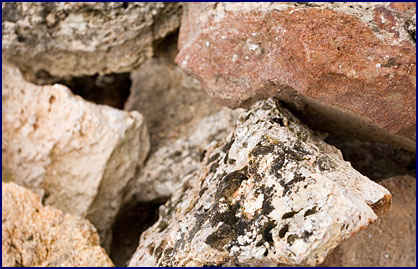Side Story: Taking 5 With Catherine Hampton
Words: Dan Kamys
Stone

50
Masonry: What is the best way to protect natural stone?
Catherine Hampton: The best way to prevent staining on natural stone is to treat the surface with a protective sealer. This creates a protective barrier that repels spills on the surface, allowing time to wipe them away. Otherwise, the liquid may damage the stone and leave behind unsightly stains. All untreated natural stone used in construction is permeable to some degree and thus should be sealed. However, the majority of impregnating sealers used to seal natural stone do not prevent etching of calcite or calcium carbonate based stone by acidic liquids. These stones include limestone, travertine, marble and onyx.
Masonry: Why is it so important to seal natural stone?
CH: Many consumers assume that natural stone is stain-proof. However, all natural stone is permeable to some degree. In fact, DuPont lab testing shows that all natural stone, including granite, is permeable, and that the lighter and more uniquely patterned natural stones stain easily. Simply spilling wine or oil on the surface can stain an unsealed countertop in minutes.
Masonry: How should a sealer be chosen?
CH: Before choosing a sealer, all stone professionals should know that the sealant selected should be based on the permeability and type of stone or masonry to be sealed. This knowledge is essential to delivering the best possible results. Proper testing of sealers on the actual surfaces to be installed will show which sealer gives the best performance. Testing will also help determine the number of sealer coats required to produce the best performance. Some dense granites may require only one coat, while a tumbled limestone paver may need three or more to achieve an efficient seal. Testing also helps determine the method and ease of sealer application. That's why it's important to use a sealer that bonds with the stone, preserving its beauty and protecting the substantial investment that homeowners make when they choose natural stone. Using a high-quality impregnating sealer is relatively inexpensive insurance that you will not be faced with a potentially permanent discoloration of a relatively expensive and unique work of nature.
Masonry: What kind of advice would you give consumers about cleaning their natural stone?
CH: We have found that most consumers are unaware of the science of the natural stone they have purchased and do not know how to properly care for the surface. Especially significant is that most do not realize that using an acid- or alkaline-based cleaner could damage the surface and negatively impact the performance of the sealer. Specially formulated cleaners that are pH neutral have been developed to remove spills and other messes from natural stone. Most general-purpose cleaners, acidic and alkaline solutions, abrasives, ammonia and bleach can break down sealers and damage stone surfaces.